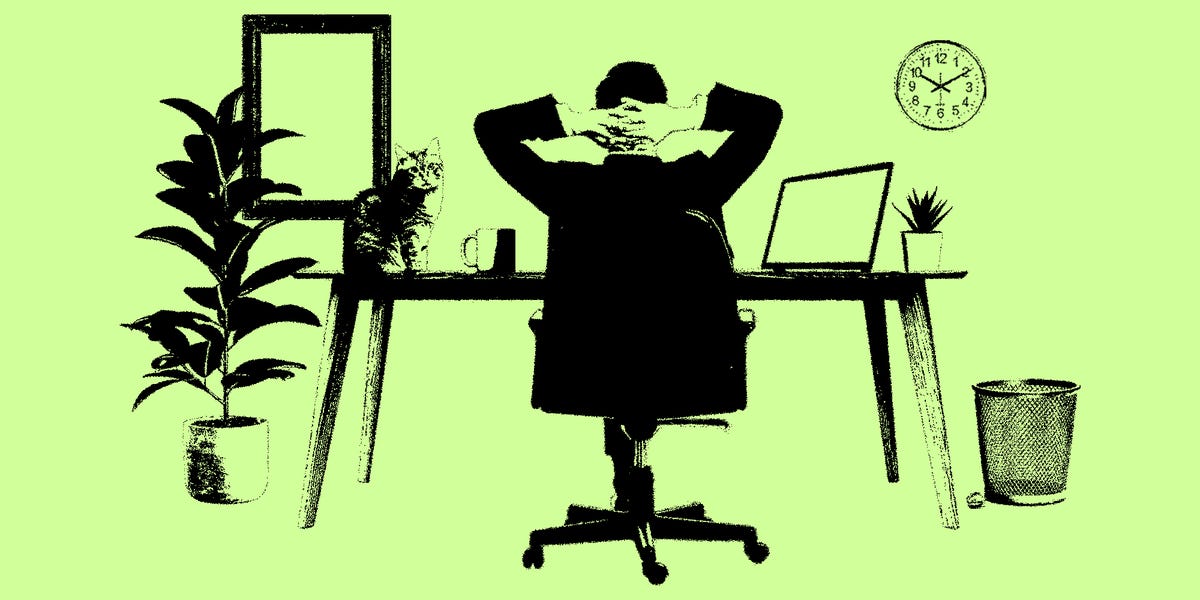This as-told-to essay is based on a conversation with Chris Blondell, a 33-year-old SEO strategist in Philadelphia. The following has been edited for length and clarity.
My first taste of remote work was during the pandemic in 2020. I was a corporate content creator, and my company told us to work from home. All of my work is done behind a computer, so the transition from office to kitchen table wasn’t difficult.
I really enjoyed working remotely. I could set my own schedule, run quick errands throughout the day, and get more done because I didn’t have workplace interruptions like office small talk.
In 2021, I started a new job as an SEO manager that required employees to be in the office full-time, but I felt too micromanaged, so I quit and started working as a freelance writer. The flexibility was great, but I also had no guaranteed pay or benefits.
I started to look for another full-time digital marketing job five months later because I wanted stability again.
I found a dream job, but it required me to work full-time in the office
I started interviewing with a digital marketing agency 80 miles from where I live in Philadelphia for a position as an SEO specialist. The job fit my background and offered amazing benefits, like paid leave, retirement contributions, and profit-sharing bonuses.
However, the job description stated that the position required me to be in the office five days a week. Since the job didn’t state that I’d have direct employees or work on a larger team, I thought they may be relaxed with their office policy.
I was wrong. When I had my final phone conversation, they gave me an offer. The salary was 20% more than what I was averaging as a freelancer every month, and the benefits were better than I’ve ever had in my entire career. I told them that since I lived in Philadelphia and didn’t have a car, I’d love to accept the offer if I could work remotely.
Instead, they offered to pay for my relocation costs and made it clear that the job had no remote flexibility because nobody else worked from home in the entire company.
I couldn’t agree to spend Monday to Friday working in an office again. I declined the offer, and I’m glad I did.
Having flexibility during my workday is essential
Even though that job paid more, it would’ve taken away how flexible my life is when I work remotely. Right now, I can run a quick errand to the grocery store, take my cat to the vet during lunchtime, or go for a mid-day walk to exercise. When I worked in an office, I’d have to save these to-dos for the weekend, and it took time away from other activities I wanted to do to unwind after the workweek.
I’ve discovered that I’m most productive when there’s a low instrumental music track playing and I can get in the zone. When I worked in an office, I had to keep taking my headphones on and off to have conversations with people around me and felt constantly distracted.
Overall, I feel more relaxed. I don’t have to deal with added stressors like a work dress code or a firm start and stop time. At my last in-office job, I couldn’t leave even one minute before 5 p.m.
I found a more flexible job two months later
After I declined the in-office job, I kept applying. This time I didn’t take any chances and only looked for offers that weren’t full-time in-office.
I found a public relations and placement coordinator job at an advertising agency. The full-time role offered me benefits like insurance, paid leave, and retirement contributions. More than that, my coworkers are polite and respectful, and I have the flexibility to work in the office or at home.
I’m not fully against going into an office, but I want to go on my own terms
I don’t mind dropping into an office every now and then or even a few times a week — I just want it to be on my own terms.
I also work from coffee shops, bookstores, or friends’ houses. It’s liberating to have the freedom to do my work from anywhere.
I plan to never take a job that requires five days in the office ever again. Working from home has completely improved my quality of life, which matters most to me.


